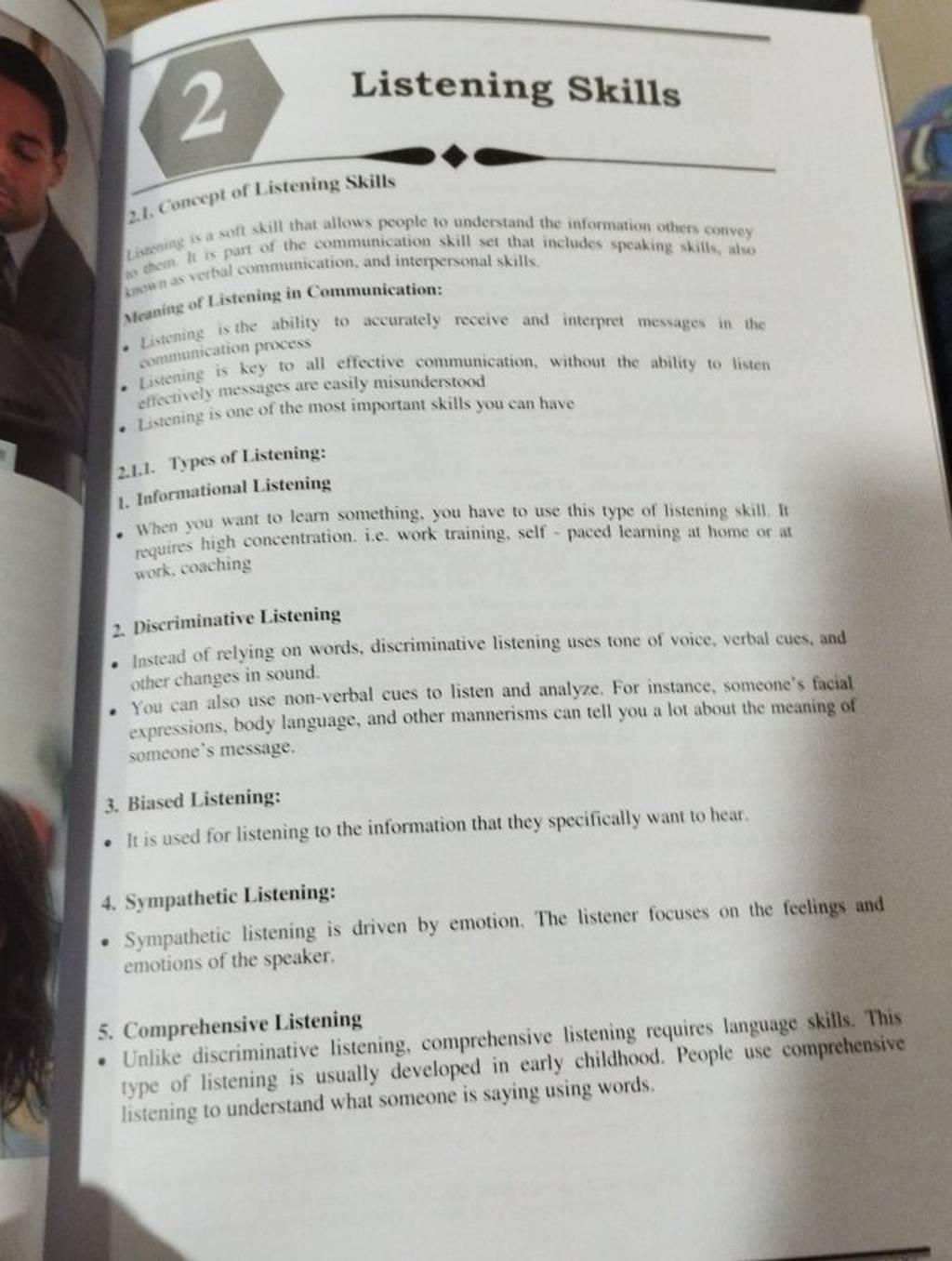Question
Question asked by Filo student

Listening Skills 2.1. Concept of Listening Skills (isering is a soft skill that allows people to understand the information others convey Meanine of 1 istening in Communication: - Listening is the ability to accurately reccive and interprel messages in the communication process - Listening is key to all effective communication, without the ability to listen effectively messages are easily misunderstood - Lwtening is one of the most important skills you can have 2.1.1. Types of Listening: 1. Informational Listening - When you want to learn something, you have to use this type of listening skill. It requires high concentration. i.e. work training, self - paced learning at home or at work. coaching 2. Discriminative Listening - Instead of relying on words, discriminative listening uses tone of voice, verbal cues, and other changes in sound. - You can also use non-verbal cues to listen and analyze. For instance, someone's facial expressions, body language, and other mannerisms can tell you a lot about the meaning of someone's message. 3. Biased Listening: - It is used for listening to the information that they specifically want to hear. 4. Sympathetic Listening: - Sympathetic listening is driven by emotion. The listener focuses on the feelings and emotions of the speaker. 5. Comprehensive Listening - Unlike discriminative listening, comprehensive listening requires language skills. This type of listening is usually developed in early childhood. People use comprehensive listening to understand what someone is saying using words.
Found 7 tutors discussing this question
Discuss this question LIVE
8 mins ago

One destination to cover all your homework and assignment needs
Learn Practice Revision Succeed

Instant 1:1 help, 24x7
60, 000+ Expert tutors

Textbook solutions
Big idea maths, McGraw-Hill Education etc

Essay review
Get expert feedback on your essay

Schedule classes
High dosage tutoring from Dedicated 3 experts


Stuck on the question or explanation?
Connect with our SBI Examinations tutors online and get step by step solution of this question.
231 students are taking LIVE classes
| Question Text | Listening Skills
2.1. Concept of Listening Skills
(isering is a soft skill that allows people to understand the information others convey
Meanine of 1 istening in Communication:
- Listening is the ability to accurately reccive and interprel messages in the communication process
- Listening is key to all effective communication, without the ability to listen effectively messages are easily misunderstood
- Lwtening is one of the most important skills you can have
2.1.1. Types of Listening:
1. Informational Listening
- When you want to learn something, you have to use this type of listening skill. It requires high concentration. i.e. work training, self - paced learning at home or at work. coaching
2. Discriminative Listening
- Instead of relying on words, discriminative listening uses tone of voice, verbal cues, and other changes in sound.
- You can also use non-verbal cues to listen and analyze. For instance, someone's facial expressions, body language, and other mannerisms can tell you a lot about the meaning of someone's message.
3. Biased Listening:
- It is used for listening to the information that they specifically want to hear.
4. Sympathetic Listening:
- Sympathetic listening is driven by emotion. The listener focuses on the feelings and emotions of the speaker.
5. Comprehensive Listening
- Unlike discriminative listening, comprehensive listening requires language skills. This type of listening is usually developed in early childhood. People use comprehensive listening to understand what someone is saying using words. |
| Updated On | Dec 6, 2022 |
| Topic | English language |
| Subject | SBI Examinations |
| Class | Class 11 |
| Answer Type | Video solution: 1 |
| Upvotes | 109 |
| Avg. Video Duration | 2 min |



